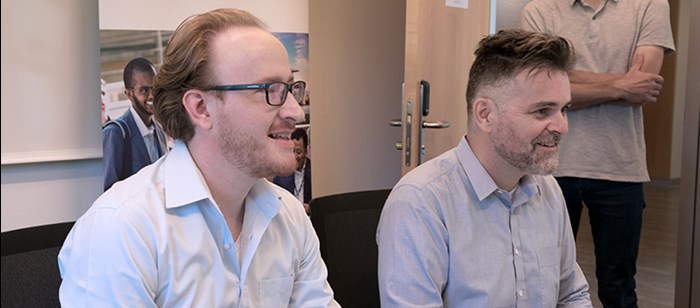Expertise is not dead. But the large-scale tool of narrative building will help leaders motivate all stakeholders in their organizations to bring about change.
This is the moment to employ Massive Collective Intelligence (MCI), said Cyril Bouquet and Mark Greeven, Professors of Innovation and Strategy at IMD.
They were joined from Paris by Frank Escoubès, Co-Founder and Co-President of Bluenove, pioneering consultancy in Massive Collective Intelligence.
“We are seeing a paradigm shift from data driven strategy to narrative driven strategy,” said Escoubès, and this change may allow leaders to redefine the very purpose of their companies.
Massive Collective Intelligence in a nutshell
MCI allows leaders to compile individual ideas and opinions from large groups of people to uncover pattern sets and structures invisible to the human eyes and minds.
“There are degrees and types of expertise,” explains Bouquet. “But we need MCI because it makes contributions to the quality of the insights we generate, because you can involve a greater range of experts and because you can maximize engagement and make people feel that they are part of the journey – they feel motivated as actors, which carries over into the resolution of the problem at the end of the journey.
“Collective sense taking will lead to collective ideation, which will lead to a collective decision and collective action.”
While it may seem counterintuitive, MCI is not data driven, but human insight driven. By canvassing a large group, leaders can map out where there are core beliefs or opinions, and where opinions diverge.
MCI motivates all stakeholders to engage with change
Typically, governments, industries and organizations look at MCI when they realize they are exposed to major problems they cannot solve with traditional techniques. ‘Wicked problems’ can be difficult to categorize and define, and it is therefore a challenge to identify a range of solutions that might make sense. Approaching them will require engagement with multiple actors. This is where MCI is a useful tool.
For example, said Bouquet, take the COVID-19 pandemic. When governments started to realize that they could not control the death rates, they began to ask a number of questions. Should we put our whole country on lockdown? What are the implications of doing that?
There was no universal right or wrong answer – it was a question of how a person values the benefits and costs of each choice. Who should decide if it is justified to let governments track the movements of people in order to identify people exposed to the virus?
“You cannot just get a group of smart people into a room to determine the answers to for the country,” said Bouquet.
But that is precisely what most countries did: they appointed a small group of highly qualified experts, Escoubès noted. “But why didn’t we tap into a wider community of experts?
“COVID-19 is an ecosystem problem, dealing with the entire health industry. About a million people in France would have a partial, limited view on some of the dimensions of the problem – doctors, nurses, assistant nurses, pharmacists.
“Why didn’t we call on related experts, where people like mathematicians, network experts, data architects, viral marking experts, psychologists, and so on. That is about 2 million people. If you go one step further, what about educated amateurs – either people directly affected by the problem, or people with a dedication for the issue at stake?”
Possible challenges
Use of MCI is new, and will challenge the conventional mindset – the idea that we should have a handful of “experts” in charge. There is also confusion between collective intelligence and collective decisions – MCI does not mean corporate democracy, Greeven said. Leaders must still weigh the pros and cons of each idea, but this should be conducted in a transparent way between top management. This group should then offer feedback to all employees and stakeholders.
Driving engagement
This is untapped potential today, says Greeven. This is a new field, but it is relevant now.
Organizations typically make decisions by just a few key people, explained Greeven. “But imagine if you could involve all stakeholders and include their perhaps diverging perspectives.“ The collective intelligence process is not just about generating insight, it is about generating engagement.
